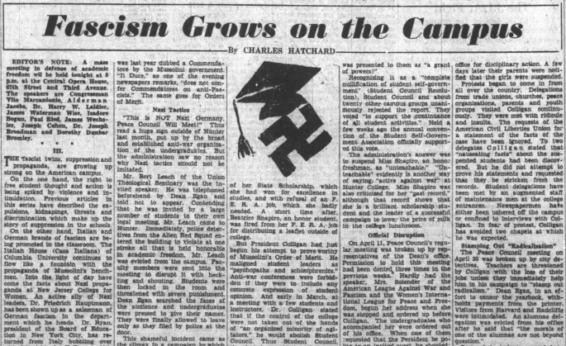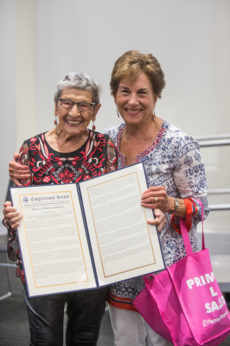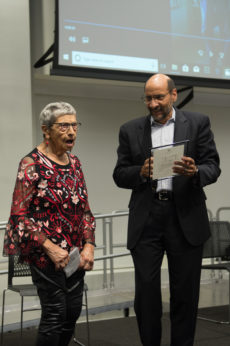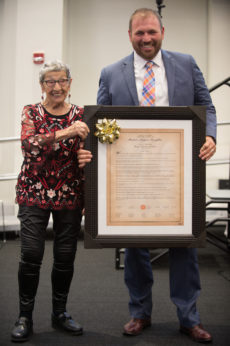
CHICAGO—On August 3, more than 300 people gathered at the Chicago Teachers Union Center to celebrate the 100th birthday of much beloved Chicago labor activist Beatrice “Bea” Lumpkin. Seasoned trade unionists, politicians, labor lawyers, and labor historians rubbed shoulders with young people from INTERGEN, the activist intergenerational and multiracial alliance that Bea helped found in 2016. The young people who stole the night, including Lakesia Collins, co-Founder of INTERGEN, were there to pay homage to a woman who understands all too well the struggles of organizing during difficult times.
Bea cut her teeth organizing low-wage African-American laundry workers in Harlem and the Bronx during the Great Depression, before the passage of President Franklin D. Roosevelt’s Wagner Act (1935). Bea and her fellow organizers, many of whom were her Communist Party comrades, joined the workers on the picket lines where they were beaten by the police and employers’ thugs for daring to demand safe working conditions, fair wages, and an end to the racist practices that had long plagued the industry. Bea learned quickly that challenging such conditions required militancy and unity.
Although she was only nineteen at the time, Bea was one of the fifteen Communists to be hired in 1937 by the newly-formed Congress of Industrial Organizations to organize the laundry workers. The campaign that ensued culminated in the organization of New York City’s 30,000 laundry workers and, more broadly, contributed to the mass movements that produced a revitalized labor movement that won important gains for all Americans, including Social Security and union rights.

Although deeply immersed in the labor struggles animating the city, Bea still found time to join marches to free the Scottsboro Nine, the nine Black youth falsely accused of raping a white woman in Alabama, and rallies protesting Italy’s invasion of Ethiopia. She took the lessons she learned from these battles to every other struggle she would wage, and there were and are so many.
In the 1950s and 1960s, Bea marched on picket lines to end Jim Crow segregation and state sanctioned racial violence and, with her much beloved comrade and husband Frank Lumpkin beside her, used her own body to integrate public accommodations and defuse volatile racial situations. She became a Chicago Public School teacher at age 47 and later became a tenured professor at Malcolm X College. When her students demanded a more diverse curriculum, Bea became a researcher and published groundbreaking scholarship on the multicultural roots of mathematics and science.
Her late husband Frank Lumpkin’s adage “Always Bring a Crowd,” the title of Bea’s important book chronicling her and Frank’s seventeen-year battle to hold Wisconsin Steel accountable for the millions of dollars of pension funds they had cheated their workers out of, was on full display on August 3.

Hundreds of Bea’s longtime friends, comrades, former students, union women from the Chicago Coalition of Labor Union Women which Bea supported from its inception, and of course her beloved children, grandchildren, great grandchildren, nieces, nephews and those who consider Bea family gathered close to celebrate an incredible woman who at the age of 100 was able to rock leather pants and a red patterned shirt.
The crowd was transnational, multiracial, intergenerational, and, most importantly, energized. How could it be anything else? This was Bea’s crowd. Guest speakers including Congresswoman Jan Schakowsky, Congressman-Elect Jesus Garcia, Chicago CLUW President Katie Jordan, Chicago Teachers Union Vice President Jesse Sharkey, Co-Founder of INTERGEN Lakesia Collins, and Scott Marshall of the Steelworkers spoke about the enormous impact Bea had had on their own lives as she organized for worker power, racial justice, peace, and gender equality.
Her beloved sons Paul and John Lumpkin brought the crowd to their feet with a personalized rendition of Union Maid. The formal part of the dinner ended with the reading of a letter from President Barack Obama, thanking her for her many years of service in support of the movement.

The battles before us loom large. As someone who began organizing during the Great Depression when fascism was on the rise, Bea understands this better than anyone. This is why she continues to show up on picket lines, at the state capitol, and in Washington, determined to preserve and expand the gains of the past.
This is why she is working with young people in INTERGEN, fighting to save Social Security, win affordable health care and free tuition, and secure a $15 minimum wage that would raise the working poor out of poverty.
And this is why she published her beautiful and moving memoir Joy in the Struggle, My Life and Love (available from International Publishers). A poignant story that is both deeply personal and historical, the book documents a life of purpose and struggle that was always full of love and joy.

Through example Bea has provided us with a vision and strategy for how to resist. She has combined her commitment to inclusivity, democracy, transparency, rank-and-file activism, and racial justice with a strategy that relies on forging interracial, intergenerational activist alliances and broad community-based coalitions. Her organizing serves as an example for those resisting ongoing racist, anti-immigrant, and imperialistic practices, and for those who are determined to challenge a neoliberal world order that is degrading worker rights, producing Gilded Age levels of income inequality, and undermining the public sector everywhere.
Bea’s life demonstrates how one person’s passion and commitment to social justice can transform individual lives, families, and communities. During these dark days when the forces of reaction are gathering strength, we have only to look to Bea to know that hope and justice will prevail. As Martin Luther King observed, and as Barack Obama reiterated, “The arc of the moral universe is long, but it bends toward justice.” Bea’s life is proof of that.
August 3, 2018 was a celebration and reminder that hope will always defeat hate; that another world is possible.










